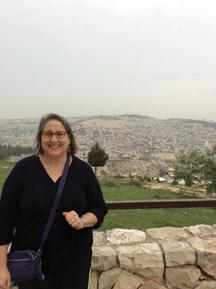
I want to tell you about the land I call home now. I made aliyah in August of this year, becoming an official Israeli, an actual citizen (though I won’t have an Israeli passport for some time still).
I want to tell you how special living here is, how meaningful it feels to be part of this amazing experiment of a Jewish state, something we haven’t had for a couple of thousand years. {mprestriction ids="1,3"}I want to tell you about the extraordinary feeling of walking through the streets of this busy, magical city feeling like I’m on a movie set, and thousands of years of history are still alive and throbbing with a passionate beat.
Even after a year and a half here, I am struck by a singular feeling again and again: elation. I feel a swell of satisfaction when I look around and see that they didn’t win. I think about all those throughout history who have wanted us dead and gone, and how we are here anyway. They didn’t win. No matter how much they have hated us, we have loved life more, and we are still here, embracing joy and happiness and moving forward. They didn’t win.
We survived the river of blood and tears that swept us out of Europe and into Israel with a sense of purpose and connection somehow still intact. We may carry collective scars and traumas, but we are here, and working every day to turn imagination into reality, to anchor the dream of Israel into the bedrock of this land.
I feel incredibly fortunate to be part of this great experiment. And when I hear so much criticism for Israel, and so much of it from Jews themselves, I remind myself that we’re still figuring it out. I remind myself that my mother is older than Israel, and that it’s going to take a little time to get it right, that a people who came together in the midst of turmoil and trauma from so many different cultures and languages and traditions are still learning how to be a nation.
But this is not a light-hearted adventure. I was here last year during the war, and am here now in the midst of this current wave of terror (or whatever we’re calling this). And when people ask how I feel, if I’m afraid, I can say honestly that I’m concerned about safety, but I’m not afraid nearly so much as I am angry and frustrated.
I am angry at those who commit violence and embrace hatred as personal and cultural values. I’m angry at those who exploit our ethical standards for their own destructive purposes. I’m angry at those who tell shameless lies to forward their own agenda. I am angry at those who excuse terrorism by blaming Israel. I am angry at those who insist on simplifying complexity at the expense of truth and honesty.
I had no idea I would feel so strongly. I had no idea I would be angry. I’ve dedicated myself to a spiritual practice that teaches that anger itself is the enemy, and that all of us suffer from anger, not just those who act on it. And yet ... I’m deeply frustrated with the futility of trying to import our western liberal humanist values into a land that is filled with ancient tribal traditions and a certain raw brutality. I’m frustrated with a model that insists this place will change to conform to the beliefs we want to impose upon it. Because what I see here is that everything is personal, everything is about tribe and family. We are not living in a hypothetical politically-correct reality. Life here is much more immediate and much more urgent. When an attacker with a knife comes after you, you don’t sit down to talk politics. You move. And fast. It is impossible to be neutral, to not take personally someone wanting you dead and gone simply because you are Jewish and you exist.
I wonder what became of the me that was always the objective outsider, the calm bystander, the spiritually astute but uninvolved observer. I still want to be that instrument for peace, someone G-d can count on to bring light and love into this world. But I see that I cannot be the same in this land as I was in the U.S., that my focus, quite organically, has narrowed and sharpened.
Living is Israel, and in Jerusalem in particular, is intense in a way I’ve never experienced before. You can’t help but feel the weight of history here, but there is also a sense of incredible holiness, as if there is a vein that connects directly with a sacred, divine life force pumping its way into Jerusalem.
So for all the complexity of daily life here, I feel incredibly blessed to be part of this experiment. I have to remind myself every day that the anger and frustration are only part of the story, and not to get swallowed up by it. To hold an Israeli ID card is to be a full participant in the improbable adventure that is Israel. So for me, for us, so far, they didn’t win.
Celeste Aronoff grew up in Overland Park and most recently served as director of communications for Jewish Family Services before moving to Israel in May 2014. She is currently studying Jewish text at the Pardes Institute in Jerusalem, and shares her experience of life in Israel as a blogger for the Times of Israel.{/mprestriction}